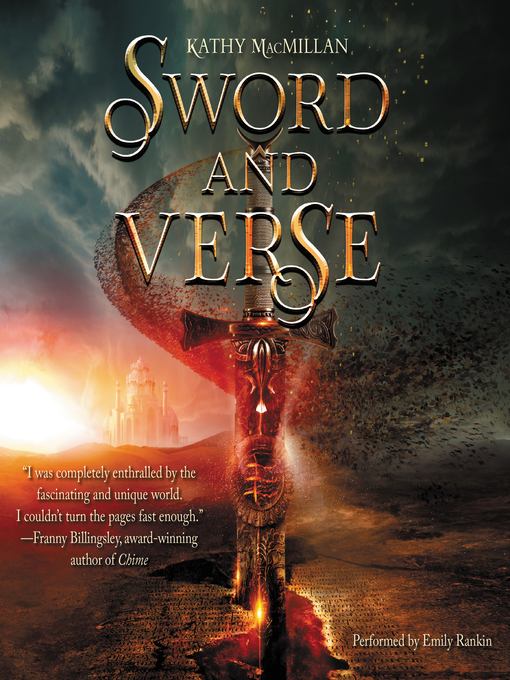
Sword and Verse
کتاب های مرتبط
- اطلاعات
- نقد و بررسی
- دیدگاه کاربران
نقد و بررسی

October 5, 2015
Fans of Megan Whalen Turner will enjoy MacMillan’s debut novel, set in the country of Qilara, in which writing is sacred to the gods, and only the king and his tutor may know the high script used to pray. Raisa, who comes from the enslaved Arnath ethnic minority, studies to become the next royal tutor, but she and the prince, Mati, fall in love. Raisa is torn between the conflicting machinations of the Arnath resistance group, who are trying to abolish slavery; her love for Mati; and the old guard of Qilarite nobility, who see Mati as a dangerous progressive. In addition, Raisa, born in freedom and captured in a raid, is trying to decipher the one piece of writing from her home that she has held onto all her life, unaware that it may be relevant to her larger problems. The integration of the peculiar Qilarite pantheon into the plot is handled awkwardly, gaining importance late in the story after being somewhat neglected, but MacMillan explains the complicated political twists and turns clearly, and her characterizations are layered and believable. Ages 14–up. Agent: Steven Malk, Writers House.

November 1, 2015
Gr 8 Up-As a small child, Raisa was taken from her family to be a slave in Qilara. There, unlike in her homeland, the arts of reading and writing are so restricted that only the king, the prince, his tutor, and the tutor-in-training are allowed to learn the higher forms of the written language. When they were separated, Raisa's father gave her a scrap of paper with some writing on it that he said was her "heart-verse," which she's never been able to read and must keep hidden. Raisa is relieved and elated to be chosen to be tutor-in-training. She may finally be able to read her heart-verse. As she studies with Mati, the prince, they become close and a romance develops. When the protagonist is conscripted to be part of an army of slaves from her homeland who are plotting to overthrow the monarchy, she has to choose between her growing feelings and her people. MacMillan has created a believable world, complete with its own mythology, which is quoted in epigraphs at the beginning of each chapter. But the story develops very slowly and the pacing doesn't pick up until halfway through. At that point, things race dramatically to the book's conclusion. VERDICT An additional purchase for libraries with voracious and dedicated fantasy readers.-Marlyn Beebe, Long Beach Public Library, CA
Copyright 2015 School Library Journal, LLC Used with permission.

November 1, 2015
Literacy becomes the key to liberation in a thoughtful debut fantasy. Tutor-in-training Raisa may be one of the most privileged Arnathim in Quilara, but she is still a slave, like all her people. Unlike them, she has learned to read and write the sacred symbols in order to teach future kings. Her relative freedom would make her an ideal recruit for the Resistance, but she fears being executed like her predecessor; besides, she's interested only in writing and in pursuing her torrid, forbidden romance with Prince Mati. But when Mati's throne, their lives, and all Quilara come under threat, she may lose any choice. Raisa's narration is cleverly interwoven with the myths of the divine origins of writing and the oppressive system it sustains, providing a fascinating spin on a common fantasy plot. Unfortunately, Raisa herself--vacillating, selfish, and shallow--is an unimpressive protagonist, and an attempt to reinscribe racial power dynamics (the Arnathim are white and curly-haired, while their oppressors are olive-skinned with straight, black hair) falls flat. While she condemns the Resistance for their distrust in Mati's (impotent) promises of reform, the Arnathim suffer mostly offstage, allowing Raisa to wallow over her ill-judged (and inherently abusive) affair. Once the nation collapses into treason, revolt, and armed invasion, the literal deus ex machina (or ex tabula) resolution seems awfully pat for a society scarred by generations of bigotry and exploitation. Kudos for a fresh take on a fraught topic but not for derailing slavery into a vehicle for romantic angst. (Fantasy. 12-18)
COPYRIGHT(2015) Kirkus Reviews, ALL RIGHTS RESERVED.

December 1, 2015
Grades 9-12 Raisa, 14, is a palace slave who cleans the Library of the Gods, a magnificent room containing manuscripts forbidden to almost everyone in the kingdomin Qilara, literacy is a privilege reserved for the king, his heir, the tutor (who taught the king), and the tutor-in-training (who instructs the heir). Raisa's secret is that, before she was kidnapped at age 6 in a raid, she had been taught to read and write, and she still retains some of that knowledge. When she is selected as tutor-in-training, Raisa rediscovers joy in learning, but also falls in love with the heir to the throne, the flirtatious Prince Mati. Their relationship is complicated by their differing social status and the fact that an underground resistance movement among slaves has enlisted Raisa's help. MacMillan's love of learning, knowledge, and literacy shapes both plot and character development, while raising ethical questions with no easy answers. Beneath what appears to be a romantic fantasy, discerning readers will find complex, broader issues among the predictable comforts of the genre.(Reprinted with permission of Booklist, copyright 2015, American Library Association.)

























دیدگاه کاربران